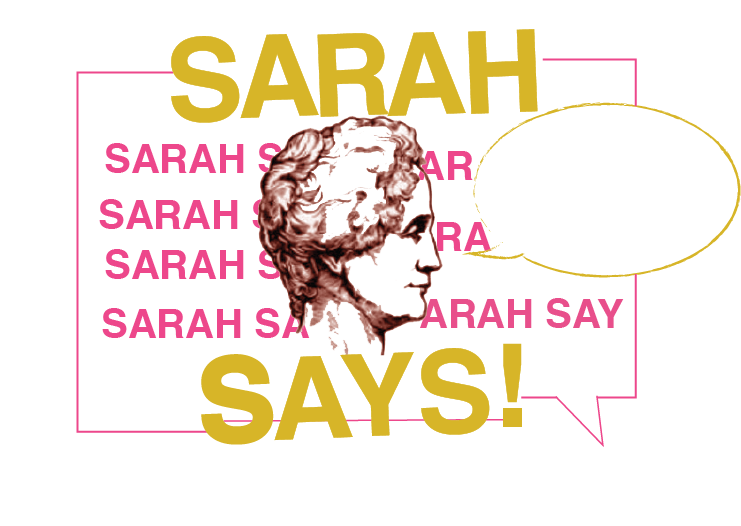Sarah Says Vol. 1 -- April 11th 2024
Sarah Lawrence Class of 1926
Artwork courtesy of Ysabella Beatriz Chiongbian Punzalan ‘24
Dear Sarah,
Is it okay to tell someone that you really do not care about a story they are telling you?
- Hey Mamas Lesbian
Dear Hey Mamas Lesbian,
Hey Mamas. Good question. I find this to be a rather tough situation that I, personally, feel I am put in at least ten times a day. Not to mention that I don’t care about a story, but I also don’t necessarily have the time to listen to long-winded stories when I am in a rush or have something to get to. Your feelings are valid, but it is important to know how to express them without offending the person you are communicating these feelings to.
I think it best to first ask yourself why you “really do not care” about the story someone is telling you. Is it because you have something to get to, or is it because the story doesn’t interest you in the way you’d prefer? Are you making enough of an active effort to listen to the story, to acknowledge the ways in which, perhaps, this story matters to the person telling it? Maybe they are excited about something and are eager to share it with you. Maybe this story is important to them at the stage that they are in in their life and, while it may not be relevant to you, it matters to them deeply and would mean a lot to them if you gave them your full attention as a recipient of the story. We often get much too entrenched in our own worlds and our own interests to acknowledge that the lives of the people around us have much different priorities and emphases, myself included. I urge you to take a closer look at why you don’t care about the story they are telling you and try to put yourself in their shoes; wouldn’t you want your friend to be an active listener?
I don’t mean to insinuate that the reason you don’t care about the story is something that is your fault. It is true that many people tell useless stories; stories that we, frankly, couldn’t care less about and that waste the little quality/free time we have with our friends. My suggestion is to share this in a constructive way with your friend, using language that does not exactly state that you don’t care about the story, but rather that you’d rather focus on more important things with them. You can say, “I know you want to tell this story, but I want to make sure we use the time we have together wisely and focus on the more important things that have happened to you that I need to know about,” obviously rephrasing it in a way that doesn’t make it seem like you are reciting a self-help book (the self-help book being me, Sarah). It’s about sharing with your friend that it is not them who bores you but rather the specific story they are telling, emphasizing that you do care about the things they have to say, redirecting the conversation in a kind and productive way.
Think about the history of stories you didn’t care about, and find a pattern. Were you moody, busy, etc., were the stories all irrelevant to you completely, or were they somehow relevant and important to the person telling them but not interesting to you? I think you can discover something about yourself in this and find a way to both become a better listener and save yourself from conversations that make you want to snooze.
— Sarah
Dear Sarah,
I’m starting to hate my friend. I think she is spoiled, delusional, and lazy. I hate how she thinks that nothing bad will happen to her because nothing has. Maybe I hate her optimism because bad things have happened to me so I know bad things can happen. Maybe I hate her because I am deeply jealous. Maybe I hate her because every time she expects things to just fall on her lap it feels like a spit in the face to me who things have never come easy for. Maybe I hate her because it’s just annoying to witness her be so out of touch. I envy how secure she is. I hate how she tries to analyze everything and everyone because I’m afraid that one day she’ll analyze me and realize that I actually hate her. Then I’ll be alone. I’m starting to hate my friend but I really love our friendship. One of the worst parts of this is that she’s never done me wrong. She hasn’t done anything but love me and wish me well. I’m not sure if I’m jealous or avoidant but I’m really starting to feel this resentment towards her and I’m not sure what to do.
- Secretly Spiteful
Dear Secretly Spiteful,
Your conundrum is common and, even with its ubiquity, is one that has no easy solution. I cannot advise you as to what you should or should not do. Both the emotional problems you and your friend seem to have are best worked out with a deep dive into their origins, their effects, and how they can be overcome. Spoiledness and delusion—as well as envy and undesired hatred of loved ones—are not simple problems and thus cannot be given simple answers. But I hope to guide you through a thinking process that can then lead to the self-reflection necessary to rectify your situation and your mindset.
It struck me that you say that you love your friendship with her. To me, the quality of a friendship is equally dependent on how well one gets along with the person (which it seems you are having a problem with) and also on how good of a friend they are (if they are there for you emotionally and physically, the effort they put into the friendship, etc.), both of which are two-way streets whose reciprocality is vital. It seems that the former aspect of your relationship to this person is lacking; as you say, you are starting to clash with their worldview and resent them for it. But you love your friendship. Explore what it is you love about it, and be sure that what you truly love about the friendship is not its convenience; be certain that it is not not that, perhaps, your friend is always there for you no matter what despite your own efforts into the relationship, not that this friend is dependant on you or looks up to you in a way you thrive on, not that this person’s friendship is one of only a few and without them, you’d have little to nothing (That does seem to be a concern, but, of course, fear of loneliness is common and a part of a lot of friendships; it is when it is the driving force of your connection to this person that it is cause for worry).
It is also important to explore where your feelings of resentment and jealousy are coming from, which you have already begun to do. Maybe it is true that you are jealous, maybe it is true that she is delusional, but it is important to decipher which one holds most true to the situation in order to properly handle it. Do these negative traits really dictate her personality, or perhaps is your jealousy projecting them onto her from a place of insecurity? It can be hard to see clearly, especially as most of us are inclined to either absolving ourselves of all blame or placing all of the blame on ourselves,, but it can be useful to speak to an unbiased third party—preferably someone who knows both of you, but that’s not necessary—to aid you. It is important to not speak too poorly of this person to your confidante and give a two-sided picture.
In the meantime, it could be useful to consider (kindly and constructively) pointing out to your friend some of the ways in which her thinking could be limited, giving her your perspective and trying to create an open line of communication between you and your friend where you can share when you feel she is acting in a way that is closed-minded. Her “optimism” for herself is not something that is necessarily hurtful to others unless it strikes a personal chord and/or gives her a blind eye to others’ suffering, but if she expects everything to fall in her lap that could be something you can point out to her when she says something that has those connotations.
At the same time, it is not your responsibility or your right to change her thinking or “correct” it, especially if your negative feelings about her have their roots in your own self-conscious thoughts. Let’s say you did “enlighten” her to her “false” beliefs and her delusion; there will only be something else that comes up, some other trait of hers to complain about. Having quality, lifelong friendships, in a lot of ways, is not about finding people who are perfect, flawless, and sticking with them. It is about acknowledging that your friends may have flaws or traits you dislike and choosing to focus more on what it is about them you love, and loving them anyway, loving their good and their bad. No one is perfect, and the search for a friend who has no negative traits will end up in perpetual frustration and loneliness. This isn’t to say that you should put up with someone who is bigoted or who treats you poorly, etc., but it is to say that small traits should not be the demise of a friendship. You can definitely distance yourself from people because of small traits if that’s what you’d prefer—if you find yourself unable to be kind to them and accept their flaws—but to end a friendship poorly over something that isn’t catastrophic doesn’t seem to be the right answer.
The most important suggestion I give, again, is that you work on yourself and your own feelings towards the situation, either by yourself or with someone else. You seem sure that some of your feelings are rooted in jealousy and envy, and I’m inclined to agree with you. Which is not to say they aren’t valid, or that you shouldn’t feel that way. Jealousy is a part of life that we all deal with; it isn’t about eradicating it, it’s about managing it in a way that does not bottle it up but deals with it and accepts it openly. Communication is key here—as it always is—between you and your friend, and you and yourself. I hope that you can find a healthy balance between knowing the ways in which your friend might be “in the wrong” and knowing the ways in which you are. Don’t be too hard on yourself or on her. Without knowing either of you, I know, like everyone, you are both flawed in different ways, but there’s no reason why that should be a source of grand shame. You’re going to be okay.
– Sarah
Submit to sarah says
Sarah wants to hear everything you have to say: what you can’t ask your friends, what your mind wanders to during lectures, what you are dying to have an answer to when you can’t quite seem to get to one yourself. Responses will come weekly. Spill your guts and let Sarah mop them up.

